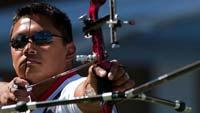Canada stakes claim on ‘Filipino’ archer

There’s a second Filipino competing in the men’s division of the archery competitions in the 30th Olympic Games in London , but, while he’s proud of his heritage, he cannot represent the Philippines.
Crispin Dueñas is a 26-year old physics major who represents the land of his birth, Canada, although his parents are pure-blooded Filipinos. Born and raised in Toronto, Dueñas would have wanted to represent the Philippines in international competitions, including the Olympics, but the Canadian archery federation, which had nurtured his career since he was 14, won’t let him go.
“They (the archery association) asked me to join the Philippine team a few years back, but Team Canada didn’t want to give me up,” Dueñas said after ranking eighth in the men’s ranking round of the archery competitions at the Lord’s Cricket Grounds.
The official Filipino in the men’s draw is Mark Javier.
Crispin is the only child of Roland and Elena Dueñas of Malabon and Manila, who migrated to Canada before Crispin was born 26 years ago. Roland is a recently retired IT expert based in Toronto and Elena, also retired, had worked for a logistics company.
Dueñas, his sun-burnt face betraying the amount of training he had logged in the heat of the North American summer, appeared confident, not only of going through the first round but also of winning the gold.
“If I shoot really, really well, I’m gonna win,” he said.
Dueñas’ confidence comes from his previous performances, including a second place finish in the World Cup in the Dominican Republic in 2010.
Dueñas, who is studying physics at the University of Toronto dreams of becoming a physics teacher.
Dueñas would have wanted to compete internationally as a Filipino, but Canada has staked its claim on the Filipino.
Joan McDonald, his coach since he was 14, said Dueñas is “absolutely” proud of his Filipino heritage and would be delighted to visit the Philippines someday.
“She’s been to five Olympics as a coach, so she knows the game in and out,” Dueñas said of his coach.
Dueñas said he’s “lusting” for two more Olympics and hopes to have a career afterwards as a high school teacher.
Meantime, he trains twice a day, six days a week. He supplements that regimen with three gym workouts a week for his cardio exercises and “to make sure overall strength is maintained” and works at “being strong enough in the head.”
Leave a comment









